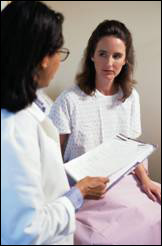CDC Features
Current Features
Women and Alcohol

Having more than one alcoholic drink per day increases a woman's chances for high blood pressure, stroke, some types of cancer, injury (e.g., motor vehicle crashes, violence), and suicide. Alcohol use, especially binge drinking (four or more drinks in about two hours), might also lead to an unplanned pregnancy, a sexually transmitted infection, or sexual assault. Some people, including pregnant women and women who might become pregnant, should not drink alcohol at all.

Drinking alcohol during pregnancy is one of the top preventable causes of birth defects and developmental disabilities, known as fetal alcohol spectrum disorders (FASDs). (Information on FASDs is also available in Spanish.)
• The good news is that FASDs are 100% preventable—if a woman does not drink alcohol while she is pregnant.
• There is no known amount of alcohol that is safe to drink while pregnant.
• There is no safe time to drink during pregnancy—alcohol can harm a baby at any time during pregnancy.
• All drinks with alcohol can hurt an unborn baby. A 12-ounce can of beer has as much alcohol as a 5-ounce glass of wine or a 1-ounce shot of liquor.
• FASDs can cause problems related to how a person grows, learns, looks, and acts. FASDs can also cause birth defects of the heart, brain, and other major organs. These problems can last a lifetime.
• About 1 in 12 pregnant women in the United States reports alcohol use.
In 2005, the U.S. Surgeon General released an advisory on alcohol use in pregnancy:

• A pregnant woman should not drink alcohol.
• A woman who is trying to get pregnant should not drink alcohol because she will not know she is pregnant for the first few weeks of the pregnancy.
• A pregnant woman who has already used alcohol during her pregnancy should stop right away.
• Because nearly half of all pregnancies in the United States are unplanned, women of childbearing age should talk with their doctor about how to prevent an alcohol-exposed pregnancy.
• Health professionals should ask women of childbearing age about their alcohol use, tell them about the risks of alcohol use during pregnancy, and advise them not to drink alcohol during pregnancy.
April 5th is National Alcohol Screening Day

April is Alcohol Awareness Month highlighting the serious problem of alcohol misuse across the United States. April 5th is National Alcohol Screening Day (NASD) where groups across the U.S. ask people questions about their drinking to learn if their drinking habits might be risky.
Experts recommend alcohol screening and brief counseling sessions to reduce alcohol misuse in adults, including women of childbearing age. Screening by a health care provider plus a brief counseling session or referral to alcohol treatment has been found to be an effective strategy for reducing alcohol-exposed pregnancies.
A provider toolkit is available for women's health care providers. This toolkit helps providers learn how to screen and advise all of their patients of childbearing age about risky drinking, and to encourage the use of effective contraception among patients who continue to engage in risky drinking. The toolkit also addresses drinking during pregnancy. Click here, for more information.
For your state's information on alcohol use among women of childbearing age, click here.
If a woman is drinking during pregnancy, it is never too late for her to stop. The sooner a woman stops drinking, the better it will be for her baby. A woman should use an effective form of birth control until her drinking is under control. If a woman is not able to stop drinking, she should contact her physician, local Alcoholics Anonymous, or local alcohol treatment center, if needed. The Substance Abuse and Mental Health Services Administration has a Substance Abuse
Treatment Facility locator. This locator helps people find drug and alcohol treatment programs in their area.
When a pregnant woman drinks alcohol, so does her unborn baby. Remember, if a pregnant woman does not drink alcohol, she will prevent serious disabilities caused by alcohol in her unborn baby.
Additional Information
- Visit our Web site, Fetal Alcohol Spectrum Disorders, to learn more about alcohol use and pregnancy.
- Download podcasts (including transcripts) on alcohol and pregnancy in English and Spanish.

- Got questions? Here are some answers.
- Order materials free of charge.
Partner Organizations
- National Organization on Fetal Alcohol Syndrome*
- Substance Abuse and Mental Health Services Administration, FASD Center for Excellence
- National Institute on Alcohol Abuse and Alcoholism
- March of Dimes*
Page last updated: May 31, 2007
Content source: Office of Women's Health
Content owner: National Center for Health Marketing
URL for this page: www.cdc.gov//Features/WomenAndAlcohol
*Links to non-federal organizations are provided solely as a service to our users. These links do not constitute an endorsement of these organizations or their programs by CDC or the federal government, and none should be inferred. CDC is not responsible for the content of the individual organization Web pages found at these links

